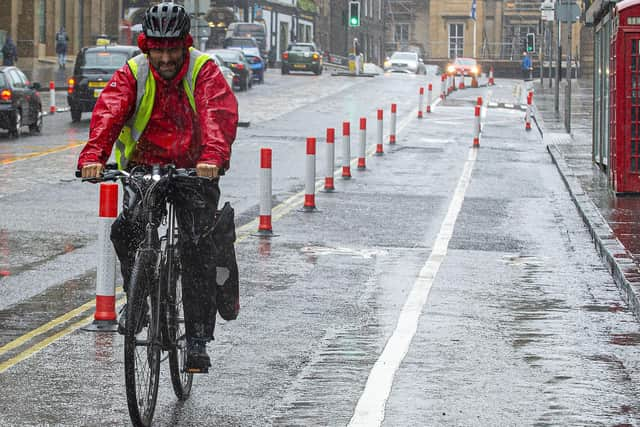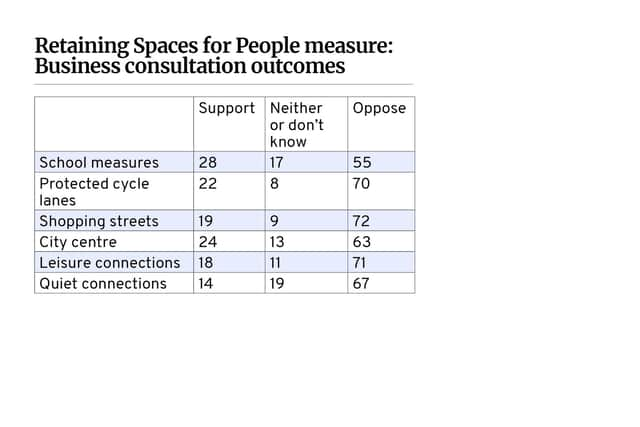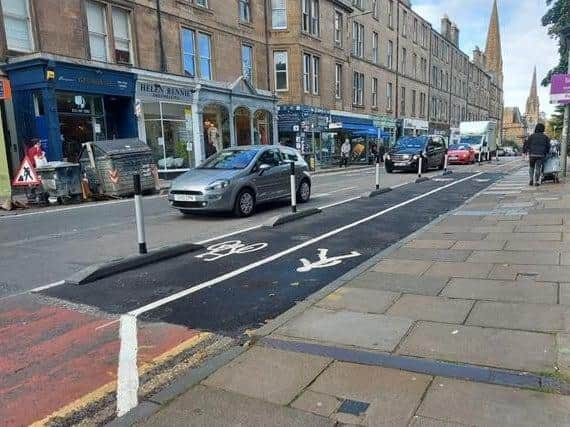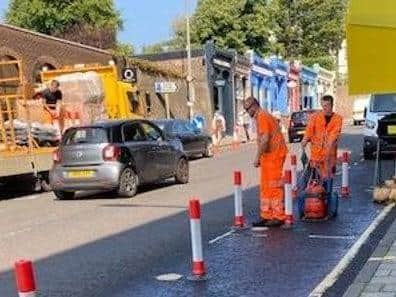Spaces for People: Will Edinburgh's controversial Covid scheme become permanent?
and live on Freeview channel 276
Let us know what you think and join the conversation at the bottom of this article.
In January, the Transport and Environment Committee voted in favour of pursuing Spaces for People (SfP) measures – introduced under Temporary Traffic Regulation Orders (TTROs) to combat the spread of Covid-19 – as permanent fixtures.
There are four stages for Edinburgh City Council to consider before deciding to make some or all aspects of the scheme permanent, including public consultation.
Advertisement
Hide AdAdvertisement
Hide AdHowever, the majority of nearly 18,000 residents, businesses and stakeholders who took part in an open public consultation were opposed with city businesses strongly expressing their criticism.
But in a weighted independent market research study the majority of the less than 600 people consulted were in favour of the scheme.
READ MORE: Spaces for People renamed Dangers for People after double yellow debacle on Edinburgh street
More than 17,600 people responded to the public consultation, which asked about their familiarity with schemes introduced to help people walk, cycle and wheel safely and whether they would like to see them kept longer-term.


Advertisement
Hide AdAdvertisement
Hide AdThe market research carried out by independent consultants provided a statistically representative sample of opinion - from a cross section of just 583 residents.
Respondents were asked for their opinions on six categories: school measures; protected cycle lanes; shopping streets; city centre; leisure connections and quiet connections. Respondents had three options: support, neither or don’t know and oppose.
The council used social media and radio to reach respondents due to the increase in people working at home and on electronic devices. Lamp post wraps and bus shelters were also used to reach people making essential journeys. The consultation was also made available in a range of formats, with BSL video to support deaf people while 180 businesses and 28 stakeholders were also approached for their opinion.


Advertisement
Hide AdAdvertisement
Hide AdThe public consultation resulted in overall opposition for a majority of the proposals except those designed to make school areas safer and less congested.
The highest levels of objection were found with leisure connections as 58 percent said they opposed while 56 percent objected to protected cycle lanes.
School measures saw only 40 percent opposition compared with 48 percent in favour.


But the independent market research which collected responses from a weighted group that represents the demographic of the capital saw an overwhelming majority of support for the various categories.
Advertisement
Hide AdAdvertisement
Hide AdThe highest level of support was for school measures with a 65 percent backing. Levels of support stand at around 60 percent for all measures bar leisure connections and quiet connections - both had a 51 percent and 45 percent levels of approval.
But city businesses overwhelmingly rejected all six of the elements of the scheme - including school measures.
Jo Davidson, director of policy at the Edinburgh Chamber of Commerce, said: “One of the key things that led to business opposition was the lack of consultation.
“TTROs were used to push through as a means of making streets safer for active travel but there is a feeling that the plans were rushed to address a temporary issue. Now they are on the road to becoming permanent even though the Covid pandemic is easing.
Advertisement
Hide AdAdvertisement
Hide Ad“Businesses have not been open for long enough or trading for long enough to be able to understand the impacts of the proposed changes. It has only been in recent weeks that we have begun to see the economy reopen.


“There is also a feeling that the SfP schemes were drawn up at a time that was not reflective of the way people normally travel around the city. Data was collected at a time that was artificial as people were furloughed and moving around the city when everything was shut down. We feel there was not proper thought given to the design of the schemes.
“Also the impact of removing parking and car access just as businesses were relying on customers returning was difficult to digest. There were also issues regarding access for those with mobility issues as well as deliveries.
“The last thing I’d say is that businesses are not against active travel, a lot of owners are citizens who actively travel the same way other residents do. But what they want is proper thought out planning and engagement with proper time frames to implement changes. They just want this done properly and up until now it has not been done with the right level of dialogue.”
Advertisement
Hide AdAdvertisement
Hide AdThrough their analysis of the data city leaders concluded that main perceived benefits were making active travel safer for children and parents travelling to school, improvements for people walking, cycling or with mobility difficulties, and better links to access green spaces for exercise.
But the main disadvantages were increased traffic and congestion, inconvenience to car users, difficulties for residents parking or receiving deliveries, delivery and parking problems for businesses and in shopping streets, and problems for people with mobility difficulties.
The council argues that retaining schemes can help achieve their business plan priorities including net zero carbon and wellbeing.
Advertisement
Hide AdAdvertisement
Hide AdSfP also aligns strongly with the City Mobility Plan, Active Travel Action Plan 2016 and City Centre Transformation and the council argues it would deliver increased protection of cyclists and pedestrians, and improve opportunities for active travel within communities and across the city.
SfP opponent David Hunter, organiser of the pressure group Keep Edinburgh Moving, has been vocal in his criticism of the measures.
He said: “Residents groups have been pretty consistent in saying that decisions for Covid emergency SfP schemes should sit with the local residents they impact. Clearly from that perspective a city wide consultation with 18k responses should be the primary driver of decision making.
“If the council - and we hope it is not the case - is now planning to spin the decision making process to somehow deprioritise the clear expressions of 18,000 residents then that position is indefensible and untenable.
Advertisement
Hide AdAdvertisement
Hide Ad“What is the point of consulting people if you ignore what they are telling you?”
Chris Young, co-chair of Low Traffic Corstorphine and a founding member of BEST Edinburgh, said some people struggled to understand SfP.
He said: “We always felt that there would be a larger proportion of opposition resulting from a broad public consultation, as that is where the emotion comes from to respond to these things.
“The room for error seems smaller with the market research and it bares out what we have been finding. There is a quiet majority that support these schemes as opposed to a loud minority who are in opposition.
Advertisement
Hide AdAdvertisement
Hide Ad“There is no denying the communication from the council has made it more difficult for the public to understand and that could have been better."
He added: “This is not meant to be anti-car but it is about a rebalancing of what cars are used for and encouraging more active travel for the shorter journeys. Over 80 percent of cyclists own a car themselves."
Following the latest round of research councillors will meet on June 17 to decide the next steps in the process.
Transport and Environment Convener, councillor Lesley Macinnes said: “Firstly, I want to thank all those who took the time to complete the consultation. The changes we have introduced reach across Edinburgh, so we wanted to hear from as many different people in communities around the city as possible.
Advertisement
Hide AdAdvertisement
Hide Ad“Officers have been assessing each of the schemes for retention using a set of criteria agreed by committee and responses to the consultation and market research will be part of this process, helping to form recommendations for the best way forward.
“I look forward to constructive debate with fellow councillors on the future of these schemes, and how they can benefit residents and visitors to Edinburgh longer term.”
Vice Convener councillor Karen Doran added: “Thanks to the feedback gathered in March, we’ll now be able to take people’s comments and ideas into account as we assess each scheme, meaning a rounded approach as we move beyond the pandemic.”
After the data was made public, Liberal Democrat transport spokesperson Cllr Kevin Lang warned: “The results underline the deep concern and widespread dismay from residents about many of the schemes.
Advertisement
Hide AdAdvertisement
Hide Ad“The question now is whether SNP and Labour councillors respect what people have said or maintain the same ‘we know best’ attitude which has been on such arrogant display for much of the last year”.
A message from the Editor:
Thank you for reading this article. We're more reliant on your support than ever as the shift in consumer habits brought about by coronavirus impacts our advertisers.
If you haven't already, please consider supporting our trusted, fact-checked journalism by taking out a digital subscription.
Comment Guidelines
National World encourages reader discussion on our stories. User feedback, insights and back-and-forth exchanges add a rich layer of context to reporting. Please review our Community Guidelines before commenting.